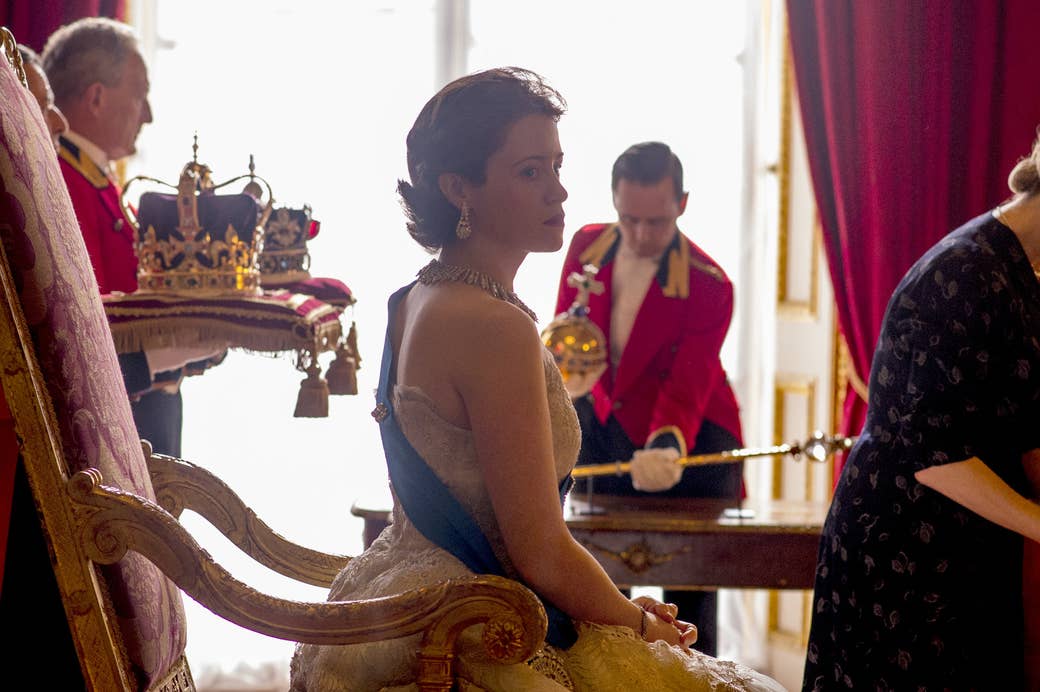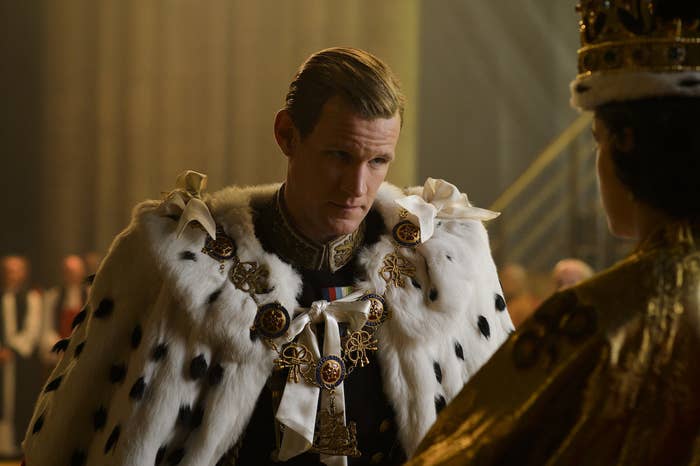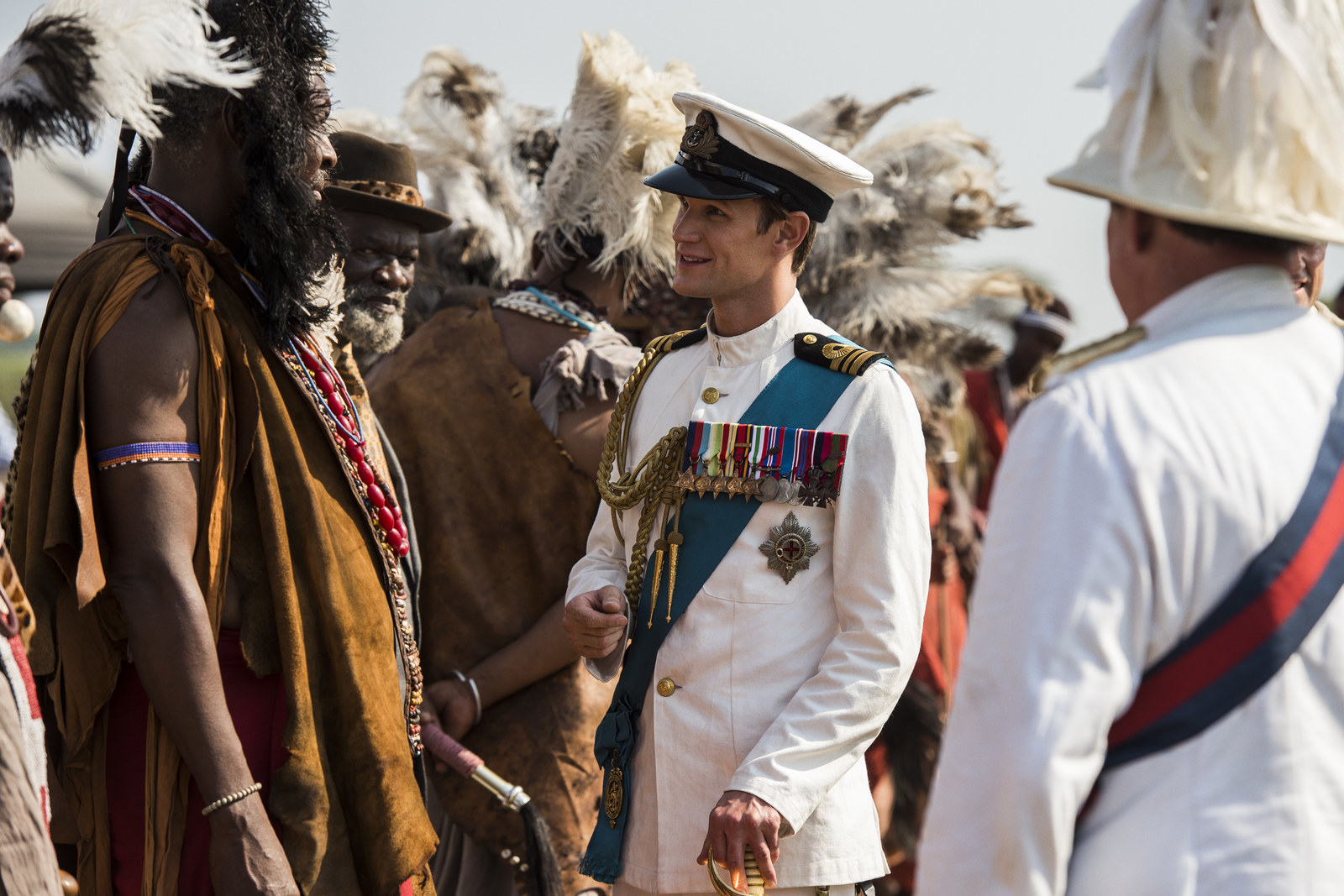
In the season finale of Netflix's new series The Crown, Queen Elizabeth (Claire Foy) asks her husband, Prince Philip (Matt Smith), to go to Australia to open the 1956 Olympic Games in her name. He pouts and says no, he won't go, and Elizabeth pleads with him: "Please, Philip, everyone just wants you to be happy." Later, when Philip is dancing with the Queen Mother (Victoria Hamilton) at a party, she too urges him to go on the trip. When he protests, again, she murmurs, "You have more freedom than any consort in history, and you repay it by scowling and skulking."
Indeed, Philip has spent most of the 10 episodes of this season "scowling and skulking," as the queen mother puts it. It's not clear whether we're meant to sympathize with Philip — whose naval career and relatively carefree life in Malta are cut short when Elizabeth becomes Queen much earlier than anyone expected — or roll our eyes at him. Smith certainly seems to think of him as a sympathetic character; he recently told Refinery29, "He's a rock star. He's a maverick. He's kind, he's witty, he's groovy. He's the sort of alien of the group who says everything and he does say things that he shouldn't." Perhaps more surprisingly, Foy agreed: "I don't think anyone could think he's an asshole from the show."
Whether you think that or not, it's hard to watch The Crown without feeling as if the Queen’s marriage is kind of a royal metaphor for every relationship between a successful woman and a man who can't handle that success. And while some of the tension between the characters could be attributed to the ways in which their relationship challenged the gender norms of the 1950s, it's also sobering to realize how much has not changed. Today, in 2016, looking back at this relationship — a prominent, visible one — it's worth asking how much progress we’ve really made in terms of the struggle between powerful women and the men who (don't?) support them.
It's also hard to watch Philip and Elizabeth’s relationship unfold onscreen in the current political moment. Would our feelings about Philip be different if Hillary Clinton had won the election? In a Daily Beast article that came out prior to the election, Kevin Fallon wrote, "There’s an undeniable thrill in watching the rise of one of the most visible female figures in modern history at a time when, just days after The Crown debuts on Netflix, the United States could be electing its first female president." Alas.
In the opening minutes of the first episode, which takes place in 1947, King George VI (Jared Harris) coughs up blood in a bathroom in Buckingham Palace. In the following scene, Philip renounces his Greek citizenship (he was the grandson of the exiled Greek king) and takes British citizenship so he can marry Elizabeth. Already, it is implied, Philip is making sacrifices for the woman he loves. But it's hard not to read Philip's decision to marry Elizabeth somewhat cynically. "Well done," his uncle, Lord Louis "Dickie" Mountbatten (Greg Wise), says to him quietly after the naturalization ceremony is over, and here we have the sense that Philip is entering into this marriage in no small part to restore his own family's name. In 1952, King George VI died, and Elizabeth ascended the throne at the age of 25.

Philip seems immediately threatened by this turn of events. He's annoyed that they must move from Clarence House, which he's just redecorated (even though he complained that the task was emasculating), to Buckingham Palace. He's furious that the family name (and the name his children will take) will be Windsor — Elizabeth's family name — rather than Mountbatten. (In real life, Philip pouted, "I am the only man in the country not allowed to give his name to his children. I’m nothing but a bloody amoeba.") And when Elizabeth asks him to chair her coronation committee (because she wants him to have something to feel in charge of), he agrees to do it only on the condition that he has full control, usurping the traditional role of the Duke of Norfolk; he then throws a fit when Elizabeth tells him he'll have to kneel to her at the coronation.
But didn't you know what you were getting yourself into? is the logical question one might have asked of Philip, and yet it seems that the answer is no, not really. Certainly, neither of them expected that Elizabeth would become Queen so soon. If she'd stayed a princess longer, he might have been able to develop more of a public identity himself (not to mention a career), instead of being forced to adhere to a strictly defined consort role. And over the course of the season, we see just how much stress the relationship causes for Elizabeth, who often feels torn between duty to the crown and duty to her husband. It was a highly unusual situation for a woman to be in — her "job" was one of the most important roles in the country, but a woman in a less rarefied position at the time (even a royal position) would have been expected to follow her husband's wishes.

Those historical circumstances don't make it any less cringe-inducing to watch Elizabeth try to apologize for Philip's immaturity. When they go on a trip to Kenya, he snidely "compliments" the hat of a chief of the Maasai tribe. "It's a crown," Elizabeth hisses at him. In fact, the real Prince Philip's public life is full of racist gaffes like this one, and worse. In 1965, he called Ethiopian art "the kind of thing my daughter would bring back from her school art lessons." During a 1986 trip to China, he told British exchange students that if they stayed in China much longer they'd "all be slitty-eyed." As recently as 2009, he asked a black dance troupe that had performed at the Royal Variety Performance whether they were "all one family."
It's hard not to look at Philip's behavior as a glaring example of the ways in which men and women are treated differently as power spouses. And sadly, not that much has changed. Even in 2016, women are still often asked or expected to choose between success in work or in their relationships, because it's seemingly impossible for a male mate to play second fiddle to a woman's professional responsibilities. Divorce rates have been shown to increase when a woman makes more money than her husband; women who earn more than their husbands actually do more housework than women who earn less — as though forced to overcompensate for the "imbalance" they've brought to their marriage.
The Crown is positioned as comforting, gorgeous escapism; it allows audiences to dream of the beautiful old past. It is not violent, or scary; indeed, the tensions and conflicts — though high-stakes — seem almost boring in a way that also serves as a balm to election-injured souls. And yet here we are, watching yet another man throw tantrums because he can't quite stomach the idea of his own unimportance. In that way, at least, Prince Philip was ahead of his time.
Want more of the best in cultural criticism, literary arts, and personal essays? Sign up for BuzzFeed Reader’s newsletter!
If you can't see the signup box above, just go here to sign up for BuzzFeed Reader's newsletter!
